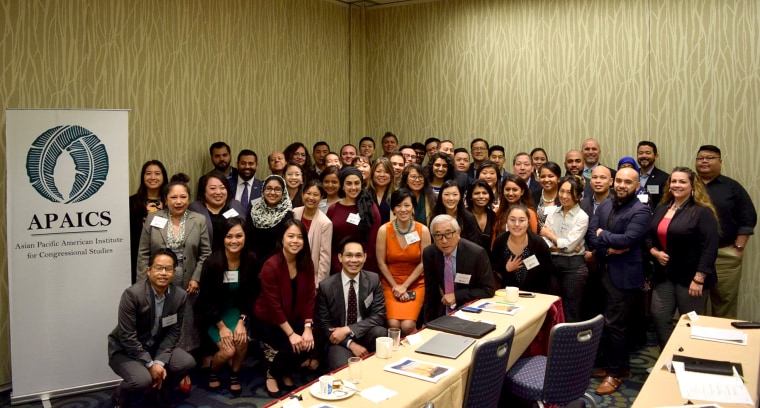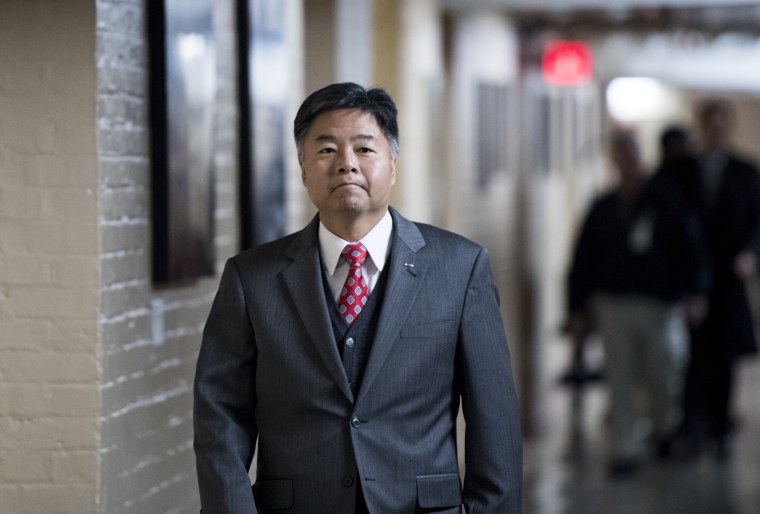Back in the late ’90s, Scott Nishimoto was a senior at the University of Hawaii when a flyer on the school bulletin board caught his eye.
It was from a recently formed nonprofit called the Congressional Asian Pacific American Caucus Institute, which was recruiting students to come to Washington D.C. to gain experience in government.
Nishimoto applied, was accepted and became the institute’s first Anheuser-Busch/Frank Hortonfellow, a life-changing experience that he said showed him what government could do — and one that paved the way for his career as a state lawmaker in the Aloha State.
“I’m just really happy that I had made that choice,” said Nishimoto, who was first elected in 2002.
For nearly a quarter of a century, that national nonprofit, later renamed the Asian Pacific American Institute for Congressional Studies (APAICS), has served as a pipeline for Asian American and Pacific Islander involvement in government and politics.
To that end, APAICS hosts national and regional leadership academies, a congressional fellowship program and paid summer internships for undergraduates, all with an eye toward increasing Asian American and Pacific Islander representation on the local, state and federal levels of government.
Madalene Mielke, president and CEO of APAICS, said the nonprofit’s training sessions include teaching candidates how to effectively use their time, how to fundraise, how to communicate through social media, and how to better build their base of influence.
More than 90 current and former elected officials have attended the institute's national programs, the group said.
“We are just one of many organizations that support the AAPI community,” Mielke said. “We like to think that we are also the beginning stages of those who are interested in running for office or those interested in public service.”
APAICS alumni were among those who racked up wins in races across the country this last November. They include Nishimoto; Rep. Ted Lieu, D-Calif.; and two Hmong Americans elected to Minnesota’s state House of Representatives, Samantha Vang and Jay Xiong.
Nishimoto, 44, said his one-year fellowship changed the arc of his life.
“Before going to D.C., I saw myself maybe becoming a lawyer and making a lot of money, or trying to make a lot of money,” said Nishimoto, now an APAICS board member who graduated from law school in 2002.
In the nation’s capital, Nishimoto was put to work covering congressional hearings for which he compiled reports that were sent out through an electronic mailing list, he said.

He called the assignment both challenging and enlightening.
“Being in D.C., seeing hearings for the first time, seeing government at work — that was really eye-opening to me,” Nishimoto said. “And it really directly led to me wanting to go into politics.”
Before being elected to Hawaii’s state House of Representatives, Nishimoto worked for the late Sen. Daniel Inouye, D-Hawaii, who he said became his role model.
“What really resonated was that he was always working and seeing how he could help Hawaii, and then how he could make our nation better,” Nishimoto said.
When it came to campaigning, Nishimoto said he had to learn a lot on his own, since APAICS didn’t have as many leadership programs to help candidates back then as they do now.
Lieu, the California congressman, credited a 2004 APAICS training session with helping him do media interviews. At the time, Lieu was a member of the Torrance City Council.
“They had a simulated reporter ask a series of questions, as if I was on TV, and then they had me respond,” Lieu said.
“Then they would play that back and show that to all the participants, and then had people critique it,” he said.
An immigrant from Taiwan and former active duty officer in the U.S. Air Force, Lieu went on to serve in California’s Assembly and Senate, later winning election to Congress in 2014.
Lieu said he now addresses attendees at APAICS seminars.
“First thing I do is I usually ask them to think about why they are running,” Lieu said. “And if they can’t come up with a good answer, then they probably shouldn’t run.”
For her part, Samantha Vang, a 24-year-old Hmong American born and raised in Minnesota, decided to run for her state’s House of Representatives this past year after seeing how little the Hmong community knew about the political process.
With a background in nonprofit work, Vang once attended a weekend APAICS training session, which she said was geared toward campaigning and running for office.
“It was a good overview of what are some things that we need to do, to consider in preparation for that,” said Vang, who was elected in November.
Vang happened to be managing the campaign of another Hmong American running for Minnesota’s House, Jay Xiong, when she decided to launch her own bid.
Xiong, who urged Vang to run, participated himself in regional and national APAICS leadership academies. He said in an email that APAICS prepares strong leaders to be even more effective, and that its support network allows Asian Americans to connect with one another in a variety of ways.
“From the workshops to networks, each time I went to a program, I was learning new things,” Xiong, 36, said. “More importantly, how to run a campaign, tell my story, and be a leader.”
Asian Americans and Pacific Islanders are part of a continuing trend of growing political involvement on the local, state and federal levels. The 116th Congress will feature 20 members of this demographic, a new high.
Now, looking toward 2019 and beyond, Mielke said APAICS is creating a new initiative to engage more Asian-American women to seek elected office.
“Every time an Asian American runs for office, they’re bringing more people out into the electoral process,” she said.
Follow NBC Asian America on Facebook, Twitter, Instagram and Tumblr.



